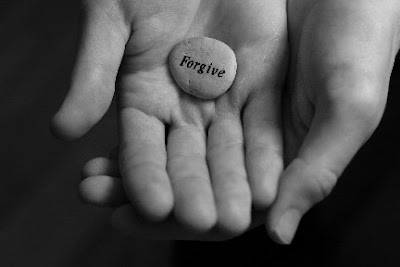Then Peter came to Jesus and asked, “Lord, how many times shall I forgive my brother when he sins against me? Up to seven times?” Jesus answered, “I tell you, not seven times, but seventy times seven.”
Matthew 18.21-22
On Sin’s Wrong Side
In all the clatter and turmoil stirred up by today’s religious legalists, it’s quite possible many of us are so conscious of being mislabeled as sinners we forget what to do when others sin against us. At our dysfunctional worst, we may truly believe we deserve the attitudes, actions, and violence leveled at us. At our disengaged best, we may take it on the chin, dismissing discrimination and ignorance as par for the course. Neither of these fulfills Christ’s law.
More is demanded of us than suffering or tolerance when we’re on sin’s wrong side. We have to reach into the depths of our souls and consciously forgive those who mistreat us. This goes for everyone—not only those we know personally, but strangers and public figures who target us with their malignant ideas and strategies. And, as Jesus explained to Peter, we forgive those who sin against us again and again and again.
No Limits
Surely, if a person continues to wrong us, he/she reaches a point where we can say, “OK, that’s it—no more forgiveness for you!” If that makes sense to you, I’m sorry to tell you authentic followers of Christ set no forgiveness quotas. And here’s why. There are no limits on God’s forgiveness. If there were, we’d all be in big trouble, as we rely on His grace and mercy on a minute-by-minute basis. Since we’re created in His image to express His love and power in the world, we’re expected to forgive others just like He forgives us. This concept is firmly stitched at the center of the prayer millions of us recite daily: forgive us our trespasses as we forgive those who trespass against us.
Jesus followed His forgiveness statement with a fascinating story. A servant owed his master a debt he couldn’t pay. The master planned to sell the servant’s family to make up the loss, but the servant pleaded for patience until he could repay it. Touched by his sincerity, the master forgave the debt entirely. Later, meeting someone who owed him, the servant wasn’t like his charitable master. He attacked the man and had him thrown in jail. News of this reached the master. Angry that the servant hadn’t offered his debtor the same mercy he received, the master withdrew his forgiveness and had his servant imprisoned. “If you don’t forgive from your heart,” Jesus said, “expect a similar fate.”
Surrender and Thrust
The etymology of “forgive” tells the whole story. It’s derived from an Old English phrase meaning “complete surrender.” In a fascinating parallel, the original Greek word suggests more than merely extending mercy to someone who’s wronged us; it’s closer to thrusting mercy upon them. Putting them together presents an illuminating idea. Forgiveness happens in two steps. First, we totally release ourselves from the pain and shame of hurts and false accusations. Then, we force our mercy to clothe those who sin against us. We no longer see them as sinners; we look at them just as God looks as us—forgiven and guilt-free.
In the parallel universe of Hallmark cards and I-heart-you posters, we hear that forgiveness leads to healing. I’m not so sure about that. Many of us have suffered or may yet suffer evil that leaves us with harrowing memories and scars us for life. What forgiveness does do, however, is alleviate the pain. It emulates God’s nature, lifting us out of our human constraints to live above the hurt. There’s no reason to carry the sins levied against us. Let’s rise above them. Our debtors may never fully appreciate the forgiveness we give. But we can’t allow that to prevent us from reaping its benefits.
Originally posted October 7, 2008.
When we forgive, we surrender our pain and thrust mercy on who those who’ve hurt us.
(Tomorrow: Underneath)

No comments:
Post a Comment